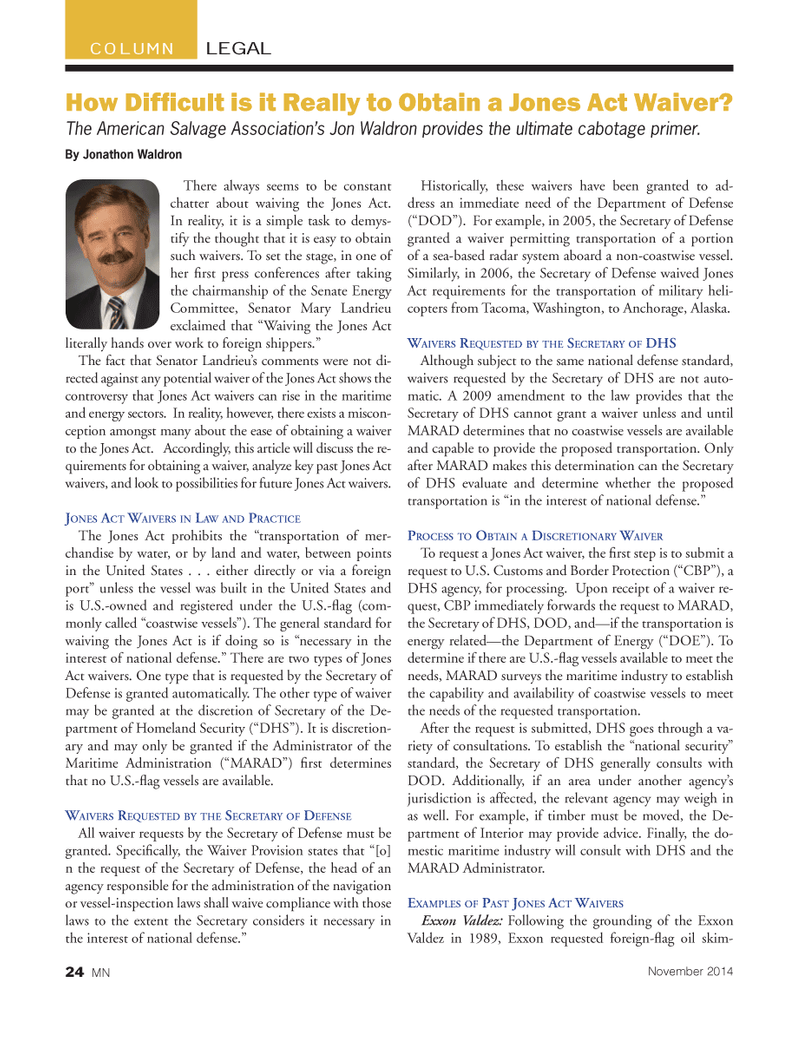
Page 24: of Marine News Magazine (November 2014)
Workboat Annual
Read this page in Pdf, Flash or Html5 edition of November 2014 Marine News Magazine
There always seems to be constant chatter about waiving the Jones Act.
In reality, it is a simple task to demys- tify the thought that it is easy to obtain such waivers. To set the stage, in one of her fi rst press conferences after taking the chairmanship of the Senate Energy
Committee, Senator Mary Landrieu exclaimed that “Waiving the Jones Act literally hands over work to foreign shippers.”
The fact that Senator Landrieu’s comments were not di- rected against any potential waiver of the Jones Act shows the controversy that Jones Act waivers can rise in the maritime and energy sectors. In reality, however, there exists a miscon- ception amongst many about the ease of obtaining a waiver to the Jones Act. Accordingly, this article will discuss the re- quirements for obtaining a waiver, analyze key past Jones Act waivers, and look to possibilities for future Jones Act waivers.
JONES ACT WAIVERS IN LAW AND PRACTICE
The Jones Act prohibits the “transportation of mer- chandise by water, or by land and water, between points in the United States . . . either directly or via a foreign port” unless the vessel was built in the United States and is U.S.-owned and registered under the U.S.-fl ag (com- monly called “coastwise vessels”). The general standard for waiving the Jones Act is if doing so is “necessary in the interest of national defense.” There are two types of Jones
Act waivers. One type that is requested by the Secretary of
Defense is granted automatically. The other type of waiver may be granted at the discretion of Secretary of the De- partment of Homeland Security (“DHS”). It is discretion- ary and may only be granted if the Administrator of the
Maritime Administration (“MARAD”) fi rst determines that no U.S.-fl ag vessels are available.
WAIVERS REQUESTED BY THE SECRETARY OF DEFENSE
All waiver requests by the Secretary of Defense must be granted. Specifi cally, the Waiver Provision states that “[o] n the request of the Secretary of Defense, the head of an agency responsible for the administration of the navigation or vessel-inspection laws shall waive compliance with those laws to the extent the Secretary considers it necessary in the interest of national defense.”
Historically, these waivers have been granted to ad- dress an immediate need of the Department of Defense (“DOD”). For example, in 2005, the Secretary of Defense granted a waiver permitting transportation of a portion of a sea-based radar system aboard a non-coastwise vessel.
Similarly, in 2006, the Secretary of Defense waived Jones
Act requirements for the transportation of military heli- copters from Tacoma, Washington, to Anchorage, Alaska.
WAIVERS REQUESTED BY THE SECRETARY OF DHS
Although subject to the same national defense standard, waivers requested by the Secretary of DHS are not auto- matic. A 2009 amendment to the law provides that the
Secretary of DHS cannot grant a waiver unless and until
MARAD determines that no coastwise vessels are available and capable to provide the proposed transportation. Only after MARAD makes this determination can the Secretary of DHS evaluate and determine whether the proposed transportation is “in the interest of national defense.”
PROCESS TO OBTAIN A DISCRETIONARY WAIVER
To request a Jones Act waiver, the fi rst step is to submit a request to U.S. Customs and Border Protection (“CBP”), a
DHS agency, for processing. Upon receipt of a waiver re- quest, CBP immediately forwards the request to MARAD, the Secretary of DHS, DOD, and—if the transportation is energy related—the Department of Energy (“DOE”). To determine if there are U.S.-fl ag vessels available to meet the needs, MARAD surveys the maritime industry to establish the capability and availability of coastwise vessels to meet the needs of the requested transportation.
After the request is submitted, DHS goes through a va- riety of consultations. To establish the “national security” standard, the Secretary of DHS generally consults with
DOD. Additionally, if an area under another agency’s jurisdiction is affected, the relevant agency may weigh in as well. For example, if timber must be moved, the De- partment of Interior may provide advice. Finally, the do- mestic maritime industry will consult with DHS and the
MARAD Administrator.
EXAMPLES OF PAST JONES ACT WAIVERS
Exxon Valdez: Following the grounding of the Exxon
Valdez in 1989, Exxon requested foreign-fl ag oil skim-
LEGALCOLUMN
How Diffi cult is it Really to Obtain a Jones Act Waiver?
The American Salvage Association’s Jon Waldron provides the ultimate cabotage primer.
By Jonathon Waldron
November 2014 24 MN
MN Nov14 Layout 18-31.indd 24 10/23/2014 10:22:53 AM

 23
23

 25
25
